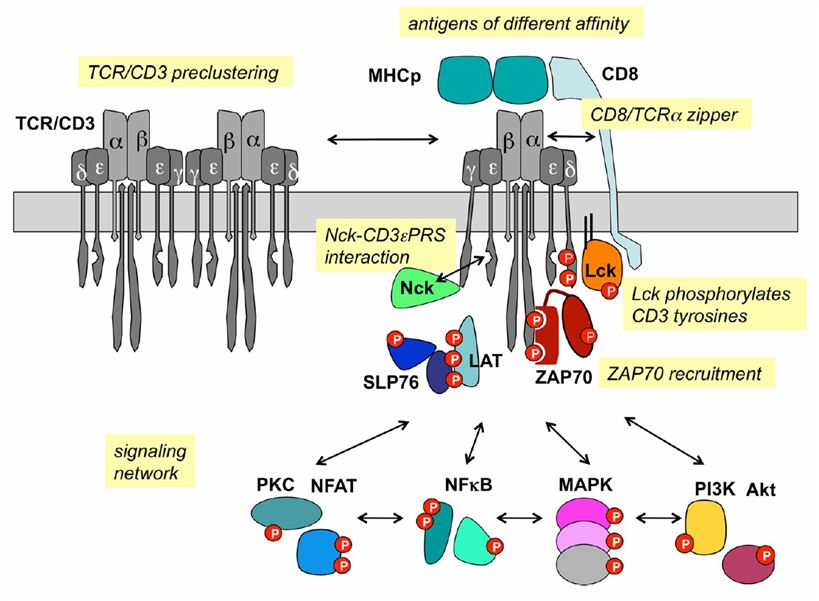Introduction to CD3
CD3 (cluster of differentiation 3) is a protein complex and a co-receptor for T cells that is involved in activating both the cytotoxic T cells (CD8+ naive T cells) and the helper T cells (CD4+ naive T cells). It consists of four distinct chains: CD3γ, CD3δ, and two CD3ε chains in mammals. These chains interact with the T cell receptor (TCR) and the CD3-zeta (ζ-chain) to generate an activation signal in T lymphocytes. The TCR, CD3-zeta, and the other CD3 molecules together form the TCR complex The CD3 chains have a single extracellular immunoglobulin domain, a transmembrane region with negative charges, and an intracellular tail with an immunoreceptor tyrosine-based activation motif (ITAM). The ITAM is essential for the signaling capacity of the TCR, as it binds to ZAP70, a kinase that activates downstream signaling molecules and transcription factors CD3 plays a crucial role in T cell development, differentiation, and function. It is also a potential target for some immune-related diseases, such as organ transplant rejection, autoimmune diseases, and some cancers.
Introduction to CD20
CD20 (cluster of differentiation 20) is a transmembrane phosphoprotein expressed on the surface of B cells, from early pre-B cells to mature memory B cells, but not on plasma cells. It is also known as B-lymphocyte antigen or B1. The exact biological function of CD20 is not clear, but it may be involved in the activation, proliferation and differentiation of B cells. CD20 forms a complex with other co-stimulatory molecules, such as CD19, CD21 and CD81, and modulates the B cell receptor (BCR) signaling pathway. CD20 is an important target for the treatment of many B cell non-Hodgkin lymphomas (NHL) and chronic lymphocytic leukemia (CLL), as well as some autoimmune diseases. Anti-CD20 monoclonal antibodies, such as rituximab, ocrelizumab and ofatumumab, can bind to CD20 and induce B cell depletion through various mechanisms, such as complement-dependent cytotoxicity (CDC), antibody-dependent cellular cytotoxicity (ADCC), antibody-dependent cellular phagocytosis (ADCP) and direct apoptosis.
Signaling Pathways Involved in Bispecific Antibodies Targeting CD3 and CD20
Bispecific antibodies targeting CD3 and CD20 are a novel immunotherapy strategy that simultaneously recognizes CD3 on T cells and CD20 on B cells, connecting two different types of lymphocytes and inducing T cell-mediated cytotoxicity against B cells. This strategy involves multiple signaling pathways, mainly including the following aspects:
TCR/CD3 complex signaling pathway: After binding to CD3 on T cells, bispecific antibodies can mimic the recognition of the antigen peptide-MHC complex (pMHC) by the T cell receptor (TCR), thereby activating the TCR/CD3 complex signaling pathway. This pathway includes the aggregation of the TCR/CD3 complex, the phosphorylation of ITAMs (immunoreceptor tyrosine-based activation motifs), the recruitment and activation of adaptors such as ZAP70 (ζ chain-associated protein 70) and LAT (linker for activation of T cells), and the activation of downstream transcription factors such as MAPK (mitogen-activated protein kinase), NF-κB (nuclear factor κB) and NFAT (nuclear factor of activated T cells). This pathway leads to the proliferation, differentiation and cytokine secretion of T cells, thereby enhancing the immune response of T cells.

Fig.1 TCR/CD3 signaling. (Louis-Dit-Sully C, 2012)
-
CD20 Signaling Pathway: After binding to CD20 on B cells, bispecific antibodies can affect the balance of the CD20 signaling pathway, thereby altering the survival and function of B cells. The CD20 signaling pathway includes the interaction of CD20 with BCR (B cell antigen receptor) or other co-stimulatory molecules, and the role of CD20 in regulating signal molecules such as calcium flux, protein kinase C (PKC), and Ras. This pathway can have different effects on B cells in different situations, including promoting or inhibiting the activation, proliferation, differentiation, and apoptosis of B cells.
-
Cytotoxic Signaling Pathway: After connecting T cells and B cells, bispecific antibodies can induce T cells to release cytotoxic molecules, thereby killing B cells. These molecules include perforin, granzyme B, Fas ligand (FasL), and TRAIL (TNF-related apoptosis-inducing ligand). These molecules can trigger apoptosis of B cells through different mechanisms, such as forming pores, activating caspases (cysteine proteases), and inducing the mitochondrial pathway.
Clinical Status of Bispecific Antibodies Targeting CD3 and CD20
Bispecific antibodies (bsAbs) targeting CD3 and CD20 represent a novel class of immunotherapeutic agents that can simultaneously activate T cells and target B cells, resulting in potent immune-mediated cytotoxicity. BsAbs targeting CD3 and CD20 have shown promising results in the treatment of B cell-related diseases, especially B cell lymphomas, in both preclinical and clinical studies. Currently, four bsAbs targeting CD3 and CD20 have been approved by the FDA or EMA, with more than 20 bsAbs targeting CD3 and CD20 in clinical trials.
Table 1. Approved BsAbs targeting CD3 and CD20
|
BsAb
|
Format
|
Affinity
|
Fc Region
|
Indications
|
|
Mosunetuzumab
|
TDB
|
Low/Low
|
Engineered hinge with FcγR-binding motif
|
FL, DLBCL
|
In addition to the approved bsAbs targeting CD3 and CD20, there are many other bsAbs targeting CD3 and CD20 that are in different phases of clinical trials, showing promising efficacy and safety profiles. There are some of the most advanced and representative bsAbs targeting CD3 and CD20 in clinical trials.
Table 2. BsAbs targeting CD3 and CD20 in Clinical Trials
|
BsAb
|
Targets
|
Platform
|
Clinical Phase
|
Indications
|
|
RG7828
|
CD3/CD20
|
KIH
|
I/II
|
Hematological malignancies
|
|
REGN1979
|
CD3/CD20
|
NA
|
II
|
Hematological malignancies
|
|
RG6026
|
CD3/CD20
|
CrossMab/KIH/TCB
|
I
|
NHL
|
|
GEN3013
|
CD3/CD20
|
DuoBody
|
I/II
|
Hematological malignancies
|
|
Plamotamab
|
CD3/CD20
|
Xmab
|
I
|
Hematological malignancies
|
References
1. Wei J, et al. Current landscape and future directions of bispecific antibodies in cancer immunotherapy. Front Immunol. 2022 Oct 28;13:10352761
2. Crawford A, Chiu D. Targeting Solid Tumors Using CD3 Bispecific Antibodies. Mol Cancer Ther. 2021 Aug;20(8):1350-13582
3. Klinger M, et al. Bispecific antibodies in oncology. Nat Rev Drug Discov. 2022 Jan;21(1):3-263
4. Staerz UD, Bevan MJ. Hybrid hybridomas and their use in immunohistochemistry. Nature. 1986 Jan 9-15;319(6050):226-8.
5. Löffler A, et al. A recombinant bispecific single-chain antibody, CD19 x CD3, induces rapid and high lymphoma-directed cytotoxicity by unstimulated T lymphocytes. Blood. 2000 Mar 15;95(6):2098-103.
6. Louis-Dit-Sully C, et al. Meeting report: Signal transduction meets systems biology. Cell Commun Signal. 2012 Apr 30;10(1):11.
7. Bargou R, et al. Tumor regression in cancer patients by very low doses of a T cell-engaging antibody. Science. 2008 Aug 15;321(5891):974-7.
8. Sehn LH, et al. Mosunetuzumab Induces Complete Remissions in Poor Prognosis Non-Hodgkin Lymphoma Patients, Including Those Who Are Resistant to or Relapsing After Chimeric Antigen Receptor T-Cell (CAR-T) Therapies, and Is Active in Treatment through Multiple Lines. Blood. 2019 Nov 13;134(Supplement_1):6.
9. Salles G, et al. Efficacy and Safety of the Novel CD20/CD3 T Cell–Engaging Bispecific Antibody Glofitamab in Patients with Relapsed/Refractory B Cell Non-Hodgkin Lymphoma: Updated Results from a Phase I Trial (GO29781). Blood. 2020 Nov 5;136(Supplement_1):40–41.
10. Bachanova V, et al. Phase I First-in-Human Study of XmAb13676, a CD20 x CD3 Bispecific Antibody, in Patients with Relapsed/Refractory Non-Hodgkin's Lymphoma and Chronic Lymphocytic Leukemia (NCT02924402). Blood. 2019 Nov 13;134(Supplement_1):4077.
11. Kebenko M, et al. Epcoritamab induces potent anti-tumor activity against CD20-positive B-cell malignancies by engaging both innate and adaptive immune effector cells in preclinical models and patients with relapsed/refractory non-Hodgkin lymphoma (NHL). Blood Cancer J. 2021 Sep 16;11(9):156.
12. Dall'Ozzo S, et al. A CD20xCD3 bispecific antibody for the treatment of B-cell malignancies. Blood. 2004 Jul 15;104(2):416-8.
13. Bacac M, et al. CD20-TCB with Obinutuzumab Pretreatment as Next-Generation Treatment of Hematologic Malignancies. Clin Cancer Res. 2018 Sep 1;24(17):4129-4139.
Our products and services are for research use only, and not for use in diagnostic or therapeutic procedures.
Welcome! For price inquiries, we will get back to you as soon as possible.
To order, please email
INQUIRY










